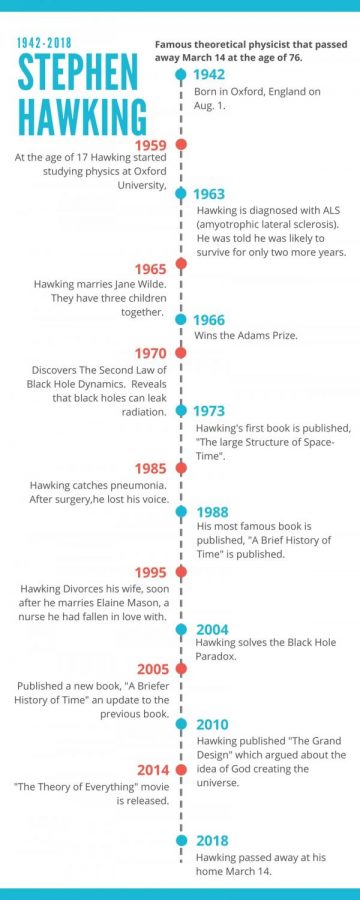Dr. Stephen Hawking, best selling author and physicist, did not let his physical limitations hinder his abilities to change the universe around him. Hawking passed away at 76, March 14 at his home in Cambridge, England.
He was able to widen the imagination of many people around the world and other fellow scientists through his book published in 1988, “A Brief History of Time:

From the Big Bang to Black Holes.” It sold more than 10 million copies and inspired documentaries based off of topics mentioned in the book.
His own life story was portrayed in the movie, The Theory of Everything, in which Eddie Redmayne played Hawking. This movie ended up winning eight awards ranging from Academy Awards to Golden Globes, four of which went to Redmayne for his portrayal of Hawking.
Hawking battled ALS (Amyotrophic Lateral Sclerosis) throughout his life, which had caused him to need the use of a wheelchair. However, this had never slowed him down with his quest to discover the universe and where it came from.
He was diagnosed in 1963 as a graduate student at Trinity Hall. He was given only a few years to live.
ALS reduced his bodily function to only the flexing of a finger and voluntary eye movements but left his mental ability untouched.
Hawking will be remembered for many discoveries, notably that of the true nature of a black hole’s explosion. Contrarily to the name, they are actually not black when exploding.
Hawking became the lead scientist of his generation in both gravity and black holes.
In 1973, his work hit a turning point that modified modern physics. Hawking applied the quantum theory to back holes. Hawking found that black holes would leak radiation and particles, fizzle and explode, disappearing over eons of time.
That calculation was known to scientists as one of the first great landmarks to find a theory on nature.
The only thing Hawking lacked to achieve was the Nobel Prize.










